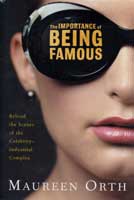Berkeleyan
The dangers of media lite
Vanity Fair reporter advises J-school students to do the ‘hard, hard work’ of reporting
![]()
| 05 May 2004
| |  |
“The line between entertainment and news is blurring,” maintains Maureen Orth. “Certainly the line between fame and infamy is already gone.”
Orth, a longtime writer for Vanity Fair magazine (and a 1964 Berkeley graduate), spoke to an audience at the Graduate School of Journalism on April 28 during a promotional tour for her new book, The Importance of Being Famous: Behind the Scenes of the Celebrity-Industrial Complex. As a special correspondent for Vanity Fair since 1993, Orth has interviewed the likes of Madonna, Margaret Thatcher, Vladimir Putin, Gerry Allen, and Tina Turner, among others.
The constant news cycle and the “monopolistic and congregated media empires” that span cable and network television and book publishing have contributed, said Orth, to a situation where “celebrity shelf life is much, much shorter” than ever before. As a result, “those who are able to command audience attention are worth a great deal more than they used to be and can demand more.”
A case in point is Michael Jackson, whom Orth has interviewed four times in the last decade. The New York Times reported that the King of Pop received $1 million for a CBS special that was to air after he dangled his baby from a Berlin hotel balcony. Jackson stipulated, however, that he be allowed to explain his behavior on the network’s “60 Minutes” news magazine. This kind of arrangement, said Orth, borders on “checkbook journalism,” which occurs when the networks or other news media are so desperate for ratings or readers that the newsmakers they’re pursuing can dictate the terms under which they’ll submit to coverage.
“We are really in a very dangerous moment,” she told the North Gate Hall audience. “As people who are trained to be journalists and trained to decide what’s going to go on the air or on the front page, you’ve got to be aware of the situation.”
Journalists might counter the lemming-like behavior so common in the media, said Orth, if they began to critique celebrity foibles rather than just report them without question. “If you show Michael Jackson, who is so addicted to fame that he steps on the hood of an SUV after he’s been arraigned for child molestation, why not use that footage and [then] ask what the signs … of pedophilia [are]?” she suggested.
All the opinions that fit
The veteran reporter expressed her concern that opinion is increasingly “masquerading as news.” Particularly on the Internet, she said, “point/counterpoint” serves as a substitute for analysis of the facts.
“It’s much easier to go on for 10 days about what Condi Rice is going to say before the 9-11 Commission than to report on the ground from Iraq,” asserted Orth.
Orth also worried that “the media is asleep at the wheel.” She offered Arianna Huffington, a woman she calls “the most ruthless, opportunistic person I’ve ever encountered,” as an example. Orth interviewed Huffington and her former husband, Michael, when the latter was running for a California Senate seat in 1994. Before the article was published, Arianna Huffington hired a private detective to “dig up dirt” on Orth — a sign, the journalist says, that her subjects had something to hide.
When Orth asked Arianna Huffington about her volunteerism, a key element in her then-husband’s platform, she claimed active involvement with a nonprofit agency that helps homeless and abused children — claims that Orth found to be patently untrue. Huffington’s apparent mendacity was matched by her chutzpah: When Orth contacted the charity agency, she learned that Mrs. Huffington had hired a television crew to film her volunteering, though the agency says she contributed neither time nor money to their cause.
“If you do real investigative journalism about these people, you find out about these things,” said Orth. “While you can lament the idea that we’re living in this era of celebrity and personality, it also behooves the journalists here to get beyond the superficial and the spin and do the legwork and the research and the hard, hard work that takes to get the real story.”

